Essential Tools of the Trade: Understanding Cremation Supplies
Cremation supplies are specialized products and equipment used by funeral homes and crematories to safely, efficiently, and respectfully perform cremation services. These supplies are only available to licensed funeral professionals and include:
- Containers & Trays - Corrugated or wood-based vessels for the cremation process
- Urns & Temporary Containers - For storing and presenting cremated remains
- Safety Equipment - Heat-resistant gloves, aprons, and face shields
- Processing Tools - Rollers, pans, brushes, and remains processors
- Identification Products - ID discs, tags, and tracking systems
The cremation rate in North America continues to rise, with the Cremation Association of North America (CANA) reporting over 1,500 member professionals serving this growing need. Quality supplies not only ensure operational efficiency but also maintain dignity throughout the entire cremation process.
I'm Mortuary Cooler, a national-level mortuary cooler supplier with experience in cremation supplies distribution across the United States, helping funeral professionals steer the essential equipment needed for safe and respectful cremation services.
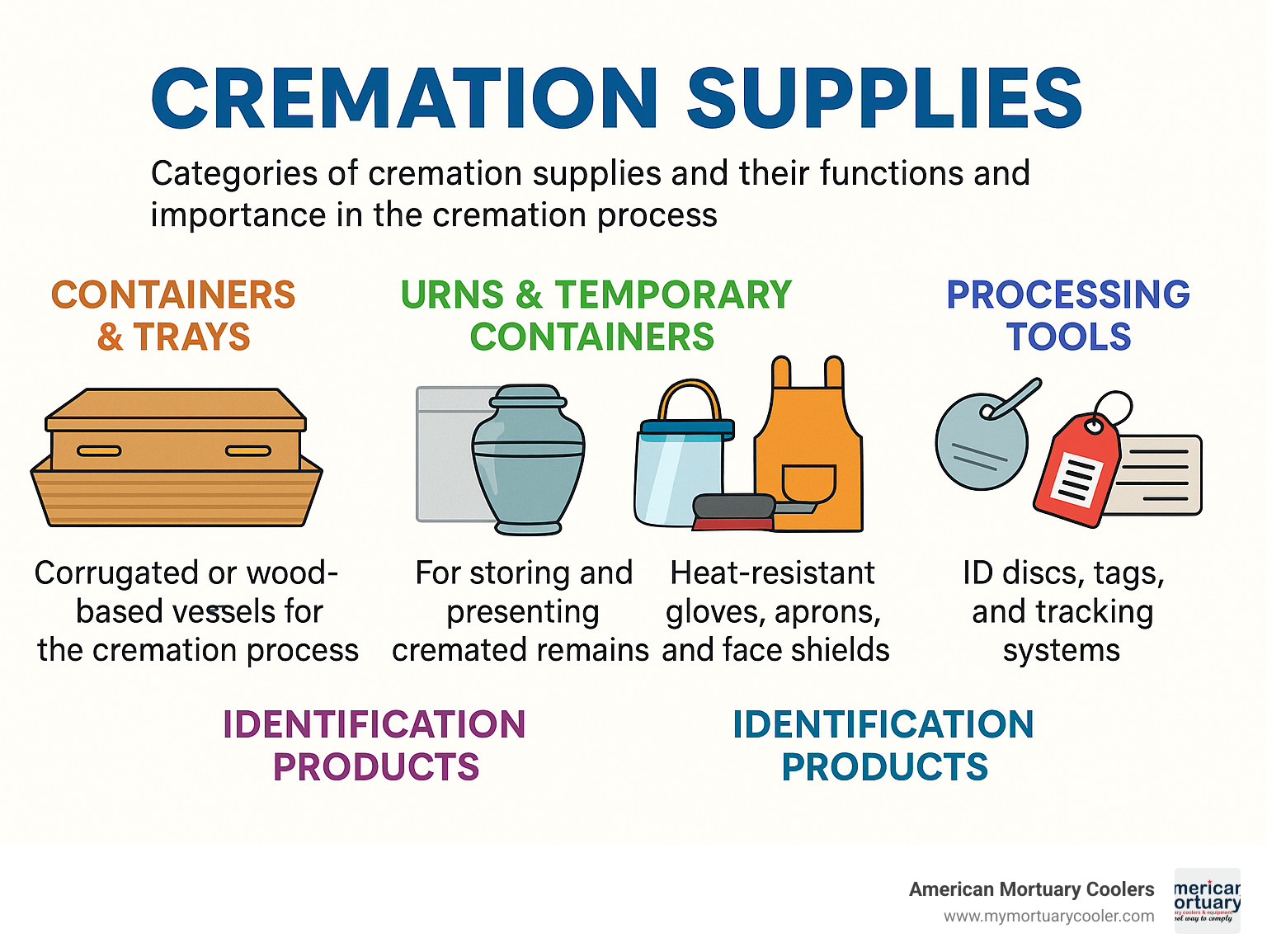
How We Chose the Best Cremation Supplies
When it comes to selecting cremation supplies, we at American Mortuary Coolers know it's not just a matter of finding the lowest price. It's about finding reliable, safe equipment that honors the deceased while protecting the professionals who use it every day.
We've spent years in this industry, and we've developed a thoughtful approach to evaluating what makes certain supplies stand out from the rest.
Industry Standards and Compliance
First and foremost, we look for products that meet or exceed the standards set by CANA (Cremation Association of North America). These aren't just arbitrary rules – they're guidelines developed by industry experts who understand what it takes to perform cremations safely and respectfully.
OSHA compliance isn't optional in our book either. The intense environment of a crematory requires equipment that not only works well but keeps operators safe during the process. As one crematory manager told us, "I don't care how inexpensive a product is if it puts my team at risk."
Durability and Heat Ratings
The cremation process is intense – with temperatures typically ranging between 1,400°F to 1,800°F. That's hotter than lava! We carefully assess each product's ability to handle these extreme conditions without breaking down or releasing harmful substances.
A quality cremation tray needs to maintain its structural integrity throughout the entire process. Cutting corners here isn't just bad business – it can lead to operational problems that no crematory wants to deal with.
Service and Support
A crematory simply can't afford downtime. That's why we prioritize vendors who offer robust support systems including 24/7 technical assistance, quick emergency response times, nationwide parts availability, and comprehensive training resources for staff.
One crematory director shared with us: "When our processor needed repair, having a vendor who answered at 6 AM on a Saturday made all the difference in maintaining our schedule." These are the kinds of real-world considerations that influence our recommendations.
Value and Bulk Pricing
Many cremation supplies are used regularly, making cost-effectiveness for high-volume purchases crucial. For example, cremation trays are typically sold in bulk packages – often 50 economy-weight trays for around $997.00. Understanding these volume economics helps us recommend solutions that make sense for your operation's budget.
Vendor Reputation and Experience
We favor manufacturers with proven track records in the industry. Take Matthews Environmental Solutions – with over 5,000 crematory equipment installations across 5 continents, their global expertise speaks volumes about reliability and quality.
| Material Type | Heat Resistance | Environmental Impact | Average Cost | Durability |
|---|---|---|---|---|
| Corrugated | Good | Lower (recyclable) | $20-30/unit | Single-use |
| Wood-base | Better | Medium | $45-60/unit | Single-use |
| Green/Bio | Good | Lowest | $50-70/unit | Single-use |
| Metal (tools) | Excellent | Highest (reusable) | $200-1000+ | Years |
When you're making decisions about equipment that will be central to your operations for years to come, having this kind of comparative information at your fingertips makes all the difference. We're not just selling products – we're sharing knowledge that helps you make choices you'll be satisfied with long-term.
1. Cremation Containers & Trays
When it comes to cremation operations, everything starts with reliable containers and trays. These aren't just boxes—they're specially designed vessels that ensure dignity and safety throughout the cremation process.
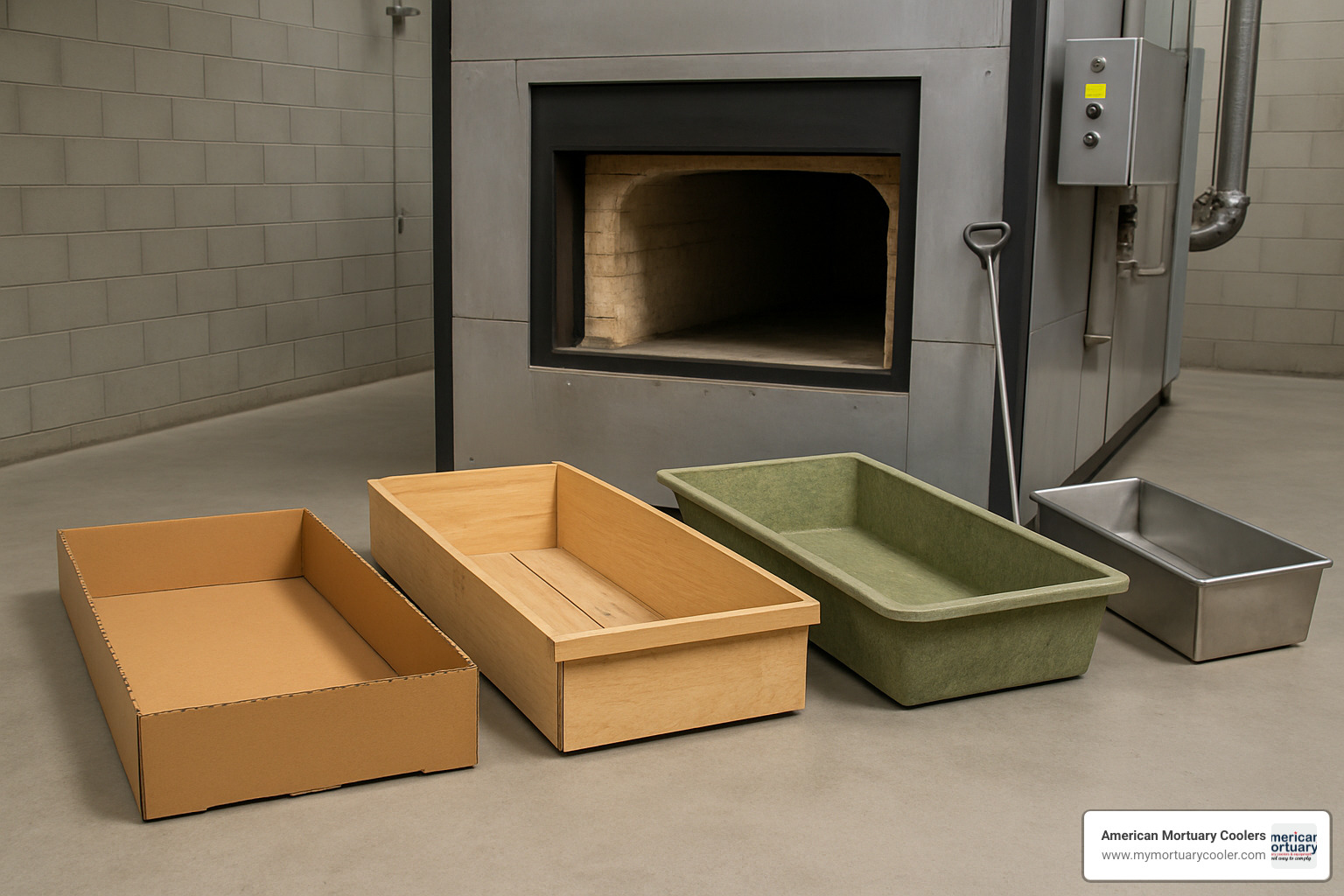
Corrugated Cremation Trays
The trusty corrugated tray is what keeps most cremation operations running smoothly day to day. Made from heavy-duty cardboard, these workhorses offer several advantages that make them popular in crematories nationwide.
They're lightweight, making them easier on your staff's backs and reducing workplace strain. Since they burn completely during cremation, there's no leftover material to deal with afterward. For busy facilities handling multiple cases daily, their cost-effectiveness is hard to beat. Plus, they stack neatly in storage, helping you maximize your available space.
Most standard corrugated trays can handle between 250-300 pounds, though you'll find specialty options for larger cases. As the folks at New England Cremation Supply (who serve hundreds of funeral homes) often say, these trays truly "form the backbone of daily operations" for most crematories.
Wood-Base Cremation Trays
When you need something with a bit more substance, wood-base trays step up to the plate. These sturdier options bring several benefits to your operation.
The improved structural support makes them ideal for heavier remains, giving your team added confidence during transfers. For families witnessing the cremation, wood-base trays present a more dignified appearance. The added rigidity also means less worry during transport and handling. As a bonus, the wood component actually improves heat efficiency during the initial phase of cremation.
One veteran crematory operator with 25 years in the field told us, "Wood-based containers provide that extra measure of security when handling larger cases. The additional cost is justified by the peace of mind." It's hard to put a price on that kind of confidence when serving families.
Heavy-Duty Options
Sometimes standard just isn't enough. That's where heavy-duty containers come in, with reinforced construction designed for special situations.
These robust options handle bariatric cases that exceed standard weight limits with ease. They're also perfect for situations requiring extended transport or handling time. Cases with medical devices or other complications benefit from the extra strength these containers provide.
Air and Combination Trays
In our mobile society, cremation supplies that facilitate transport are increasingly important. When cremated remains need shipping or when bodies must travel by air, specialized containers become essential.
Air trays provide rigid exterior protection that stands up to the rigors of freight handling. Combination trays include both an interior container and exterior shipping shell—essentially a complete transport system. Both must comply with airline regulations and shipping laws, which vary by jurisdiction.
Our research shows these specialized shipping containers are becoming must-haves for funeral homes serving families across geographic boundaries. As one supplier noted, "Air trays and combo trays for shipping remains have become increasingly important as families spread across the country."
Picking the Right Cremation Supplies Container
Choosing the right container isn't just about what looks good—it's about what works best for your specific situation. Here's what to consider:
Weight considerations matter tremendously—always check the manufacturer's weight rating and add a safety margin to be sure. The type of service plays a role too, as witnessed cremations may warrant more presentable containers. Ensure compatibility with your equipment, checking your cremator's dimensions and loading system before purchasing.
Balance your budget considerations against operational needs, and don't forget about combustion efficiency—some containers burn cleaner and faster, potentially reducing your cycle times and energy costs.
A CANA-certified crematory operator summed it up perfectly: "The right container isn't just about containing remains—it's about operational efficiency and safety. We've found that investing in quality cremation supplies reduces complications during the process."
Want to dive deeper into container emissions research? Check out this scientific research on container emissions or learn more about the equipment these containers work with in our guide to Cremation Machines.
2. Urns & Temporary Containers
Once cremation is complete, the processed remains need appropriate vessels for storage, presentation, and transfer to families. The range of options is extensive, reflecting diverse family preferences and price points.
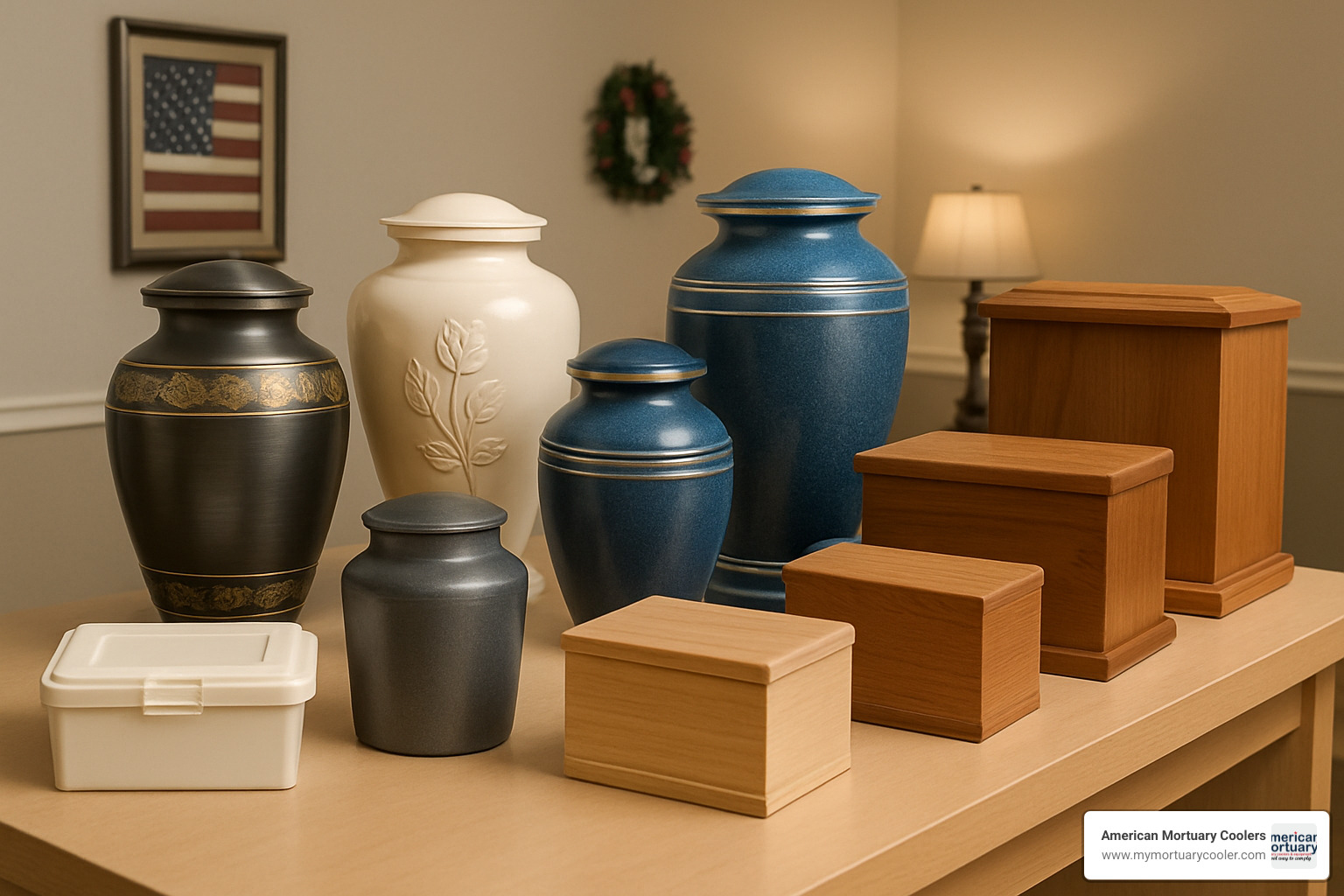
Temporary Containers
When the cremation process concludes, funeral professionals first use these practical vessels as immediate receptacles. The standard black or green plastic snap-lock urns (typically sold in cases of 36 for around $105) provide a dignified first home for cremated remains. Many funeral homes also keep cardboard boxes with secure closures or simple metal containers with screw-top lids on hand.
"Temporary urns are the starting point for most cremation arrangements," shares a funeral director with 15 years of experience. "They provide a dignified, secure container while families consider permanent options."
Think of these temporary containers as the bridge between the cremation process and the family's final decision—practical, respectful, and giving everyone the gift of time to consider more permanent choices.
Permanent Urns
The world of permanent urns offers families nearly endless possibilities to honor their loved ones. Metal urns crafted from bronze, brass, stainless steel, and aluminum provide durability with timeless appeal. For families drawn to natural materials, wood urns range from simple pine designs to exotic hardwoods featuring intricate inlays that showcase master craftsmanship.
Those seeking something with natural elegance might choose ceramic and stone options like marble, granite, or handcrafted ceramics. Environmentally conscious families appreciate biodegradable options designed specifically for green burials or water scatterings. When couples wish to remain together even after death, companion urns—larger vessels designed to hold the remains of two people—offer a beautiful solution.
Specialized Urns and Accessories
Beyond standard options, today's cremation supplies market has evolved to meet families' diverse needs. Keepsake urns—smaller versions of full-sized urns—allow families to divide remains so multiple loved ones can maintain a physical connection. For those who want to keep their loved one even closer, jewelry urns like pendants and other wearable vessels hold a small portion of remains.
Families planning to scatter remains often appreciate scattering tubes designed for easy, dignified dispersal in meaningful locations. When burial is the plan, urn vaults provide protective outer containers that preserve the urn's integrity. For memorial services, display kits with tasteful presentation materials help create a dignified focal point.
Shipping and Mailing Options
In our mobile society, cremated remains often need to travel. Urn mailers provide specialized packaging that meets postal regulations while protective cases prevent damage during shipping. Proper documentation kits with forms and labels ensure compliance with shipping regulations.
"The right mailing container isn't just about protection—it's about compliance," explains a cremation supply specialist I recently spoke with. "USPS and other carriers have specific requirements for shipping cremated remains that funeral professionals must follow."
How Funeral Homes Decide on Cremation Supplies Urns
Smart funeral professionals consider several factors when selecting their urn inventory. They start by understanding family preferences based on their community's demographics and cultural factors. They create a thoughtful margin mix, balancing affordable options with premium selections to serve diverse budgets.
Savvy professionals also pay attention to inventory rotation, stocking frequently selected styles while limiting slow-moving inventory. Their display strategy creates effective showroom presentations that help families visualize options without overwhelming them. Many also offer personalization capabilities like engraving, custom artwork, or photo integration that make each urn uniquely meaningful.
"We've found that offering a curated selection of urns—rather than overwhelming families with too many choices—leads to greater satisfaction," shares a funeral home manager who serves over 300 cremation families annually. "It's about quality options, not endless ones."
At American Mortuary Coolers, we understand the importance of these final vessels in the cremation process. That's why many of our partners rely on us to help them create the right storage environments for their cremation supplies, ensuring everything from temporary containers to fine urns remains in perfect condition until needed.
More info about Choosing Cremation Urns
3. Safety Gear & PPE for Operators
The extreme temperatures and physical demands of cremation operations require specialized safety equipment to protect staff. Proper personal protective equipment (PPE) isn't just recommended—it's essential for OSHA compliance and operator wellbeing.
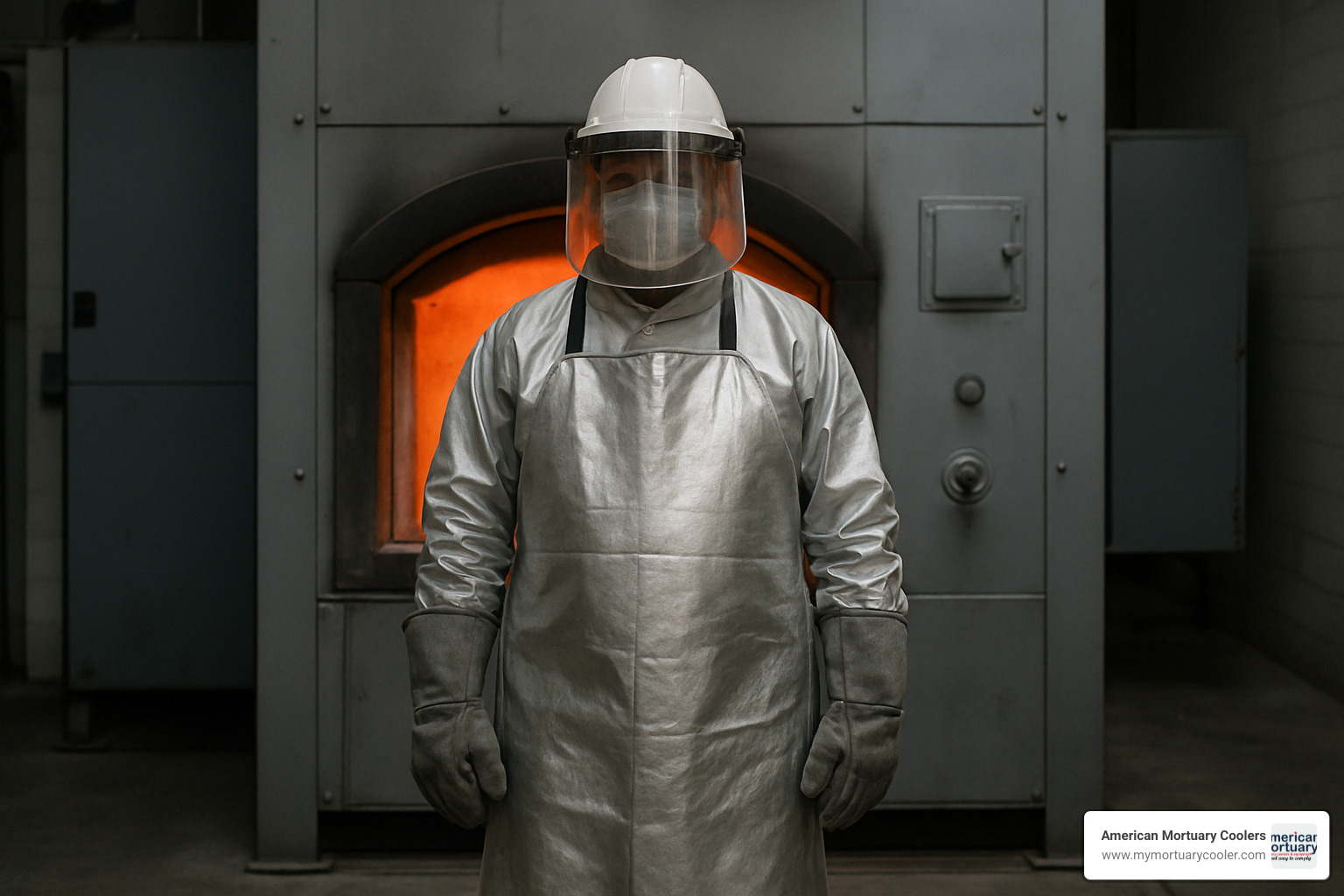
Heat-Protective Apparel
When you're working with temperatures reaching up to 1,800°F, ordinary work clothes just won't cut it. That's why crematory operators need specialized heat-resistant gear that stands between them and serious injury.
Aluminized aprons are the frontline defense, reflecting intense radiant heat away from vital organs. These aren't your backyard BBQ aprons—they're engineered specifically for industrial heat protection. Paired with these, heat-reflective gloves give operators the dexterity and protection needed when loading or maintaining equipment.
"I once saw an operator try to use standard work gloves during a loading procedure," shares a crematory safety trainer with 20 years of experience. "The difference between those and proper heat-reflective cremation gloves was the difference between going home safely and a trip to the emergency room."
For complete protection, flame-resistant leather sleeves shield arms from unexpected heat flares, while heat-resistant footwear keeps operators steady and protected from hot ash or debris that might find its way to the floor.
Face and Respiratory Protection
Your face and lungs deserve extra attention in the crematory environment. Face shields provide that crucial barrier against heat, unexpected flashes, and airborne particles during the cremation process. They're designed specifically to withstand high-temperature environments while maintaining visibility.
Respiratory protection matters too. Quality respirators filter potential airborne hazards, especially during the processing phase when fine particulates might be present. Meanwhile, safety glasses offer that extra layer of eye protection during maintenance and cleaning operations when the face shield might be impractical.
One crematory manager told us, "We treat our cremation supplies for safety as non-negotiable investments. The cost of good PPE is nothing compared to the cost of an injured team member."
Signage and Documentation
Safety extends beyond what you wear—it's also about maintaining awareness and proper procedures. Safety signage kits provide those crucial warnings and instructions that keep everyone informed of hazards and protocols. They're not just decorative—they're required by regulations and serve as constant reminders.
Maintaining operator log books creates accountability and ensures safety checks become routine. These simple documents can make all the difference during inspections or, heaven forbid, after an incident. Similarly, emergency protocol cards posted in visible locations give clear guidance when quick action is needed.
OSHA and CANA Compliance
Meeting regulatory requirements isn't optional in this industry. OSHA standard 1910 outlines specific requirements regarding heat exposure and protective equipment that every crematory must follow. Beyond these federal minimums, CANA (Cremation Association of North America) offers best practices that represent the industry's collective wisdom on safety.
Don't forget that state and local regulations might impose additional safety standards depending on your location. Staying up-to-date with these requirements is part of responsible crematory management.
"We conduct quarterly safety audits of all our cremation supplies and equipment," explains a multi-location crematory manager. "It's not just about checking boxes for compliance—it's about creating a culture where everyone goes home safely every day."
The investment in proper safety gear pays dividends not just in avoiding injuries but in operator confidence. When your team knows they're protected, they can focus on providing dignified service rather than worrying about their safety. As research from Cremation Care Products shows, properly equipped operators report higher job satisfaction and lower stress levels—benefits that extend well beyond basic safety.
4. Tools, Equipment & Identification Essentials
The technical aspects of cremation require specialized tools designed for efficiency, safety, and dignity throughout the process.
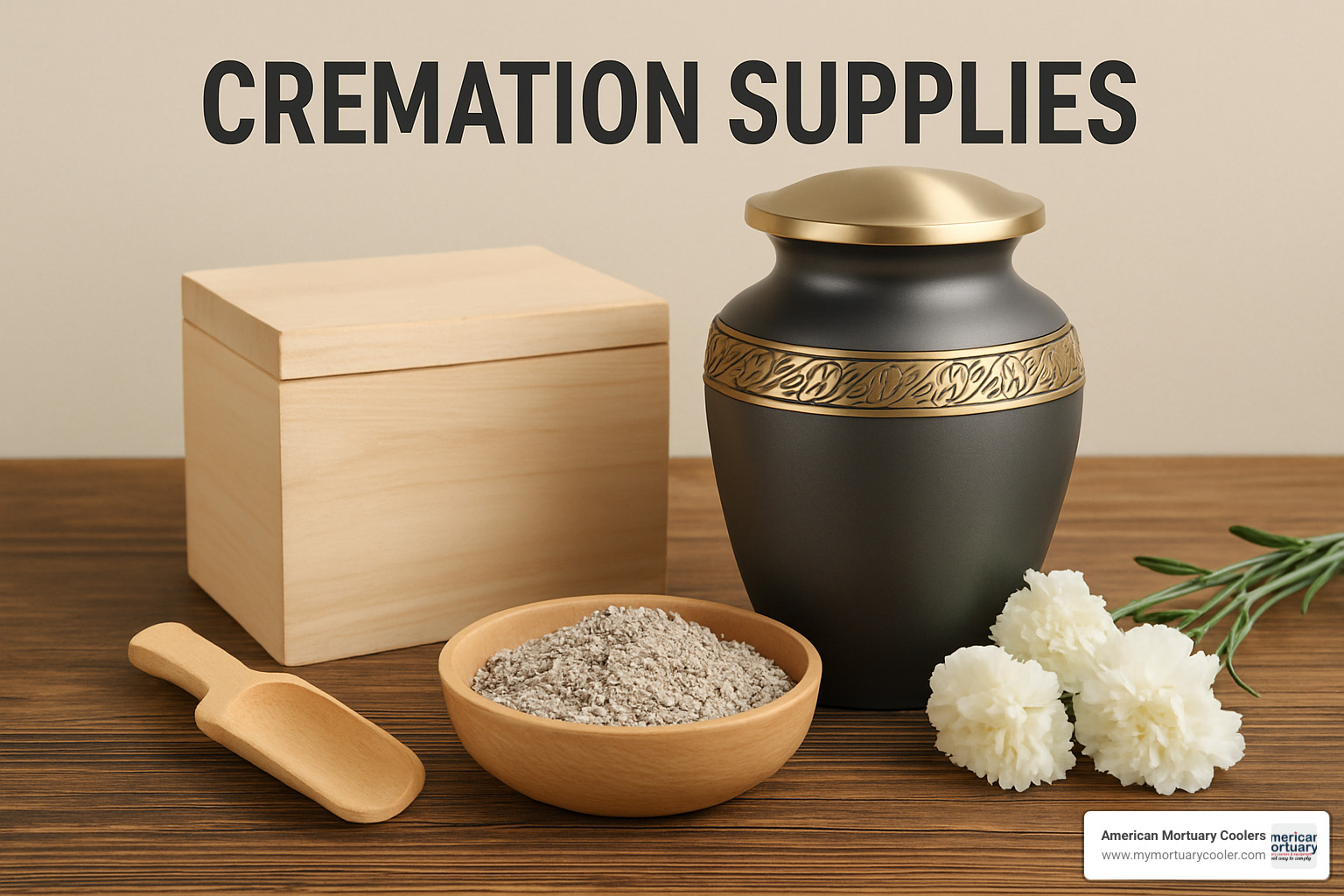
Processing Equipment
When the cremation is complete, the remains need careful processing to achieve a consistent, respectful presentation. This is where quality equipment makes all the difference.
The heart of any processing setup is a reliable remains processor. These specialized machines gently reduce cremated remains to a uniform consistency that families expect. Many crematories have adopted the ECP-200 Human Cremation Remains Processor as their go-to solution.
"A quality processor isn't just about efficiency—it's about treating remains with dignity," explains a crematory operator who handles over 1,000 cases annually. "When families receive the urn, they never see our behind-the-scenes work, but they absolutely feel the difference."
Ventless processing stations have become increasingly popular, containing dust and particles during processing. These stations protect operator health while maintaining a clean workspace. Complementing these are sturdy processing pots that safely hold remains during the reduction process.
Loading and Handling Tools
Moving remains safely into and out of the cremation chamber is both physically demanding and emotionally significant work. The right tools make all the difference.
Cremation rollers are the unsung heroes of many facilities, enabling smooth transfer of containers into the chamber without strain or risk. For staff wellbeing, hydraulic lift tables reduce physical strain during loading—an important consideration when handling multiple cases daily.
After cremation, transfer pans made of durable stainless steel safely move remains for processing. The final step often involves ash loaders, specialized tools that transfer processed remains into urns without spillage or waste—preserving every precious particle for the family.
Maintenance and Cleaning Tools
Behind every efficient crematory operation is a set of reliable maintenance tools. These workhorses keep equipment running smoothly day after day.
Clean-out brushes with heat-resistant bristles remove residual ash from the chamber, preventing buildup that could affect performance. After cooling, hand magnets help recover non-combustible materials like joint replacements that families might request as keepsakes.
During operation, rake heads allow operators to gently move remains for more efficient processing. Temperature management is critical, with thermocouples monitoring conditions inside the chamber. Many facilities still rely on traditional temperature charts and pens to document operating conditions for compliance and quality control.
"Regular maintenance isn't just about equipment longevity—it's about operational efficiency," notes a veteran crematory technician. "Simple tools like quality clean-out brushes can extend the life of expensive equipment and prevent costly downtime."
Identification Systems
Nothing is more important in cremation services than maintaining positive identification throughout every step. The best cremation supplies include robust ID systems that leave no room for error.
Cremation ID discs remain the gold standard—heat-resistant tags that survive the intense temperatures of cremation and permanently link remains to the deceased individual. These typically cost around $76.90 per pack, a small but crucial investment in maintaining proper identification.
Modern facilities often supplement traditional methods with barcode systems for digital tracking and RFID technology that allows electronic monitoring throughout the process. These technologies integrate with chain-of-custody logs that document every transfer and handling step.
Maintaining Traceability from Door to Urn
The identification process begins the moment a loved one arrives and continues through every step until the remains are presented to the family.
First comes initial tagging, attaching permanent identification to the deceased upon arrival. Before cremation, staff perform pre-cremation verification, often with a second staff member confirming identity. During cremation, heat-resistant ID discs maintain identification through the process itself.
After cooling and processing, post-processing confirmation ensures the right remains go into the right container. Throughout the journey, detailed documentation creates an audit trail that can provide peace of mind to both the facility and families.
"We use a triple-check system for every case," shares a crematory manager with pride. "Having robust identification protocols with proper cremation supplies isn't just about avoiding mistakes—it's about giving families absolute confidence in our process."
For more technical information about the equipment that performs the actual cremation, check out our guide on Cremation Retort 101, which explains the inner workings of cremation chambers.
5. Eco-Friendly & Innovative Cremation Supplies
As environmental awareness grows, the cremation industry is responding with greener alternatives and innovative approaches to reduce environmental impact.
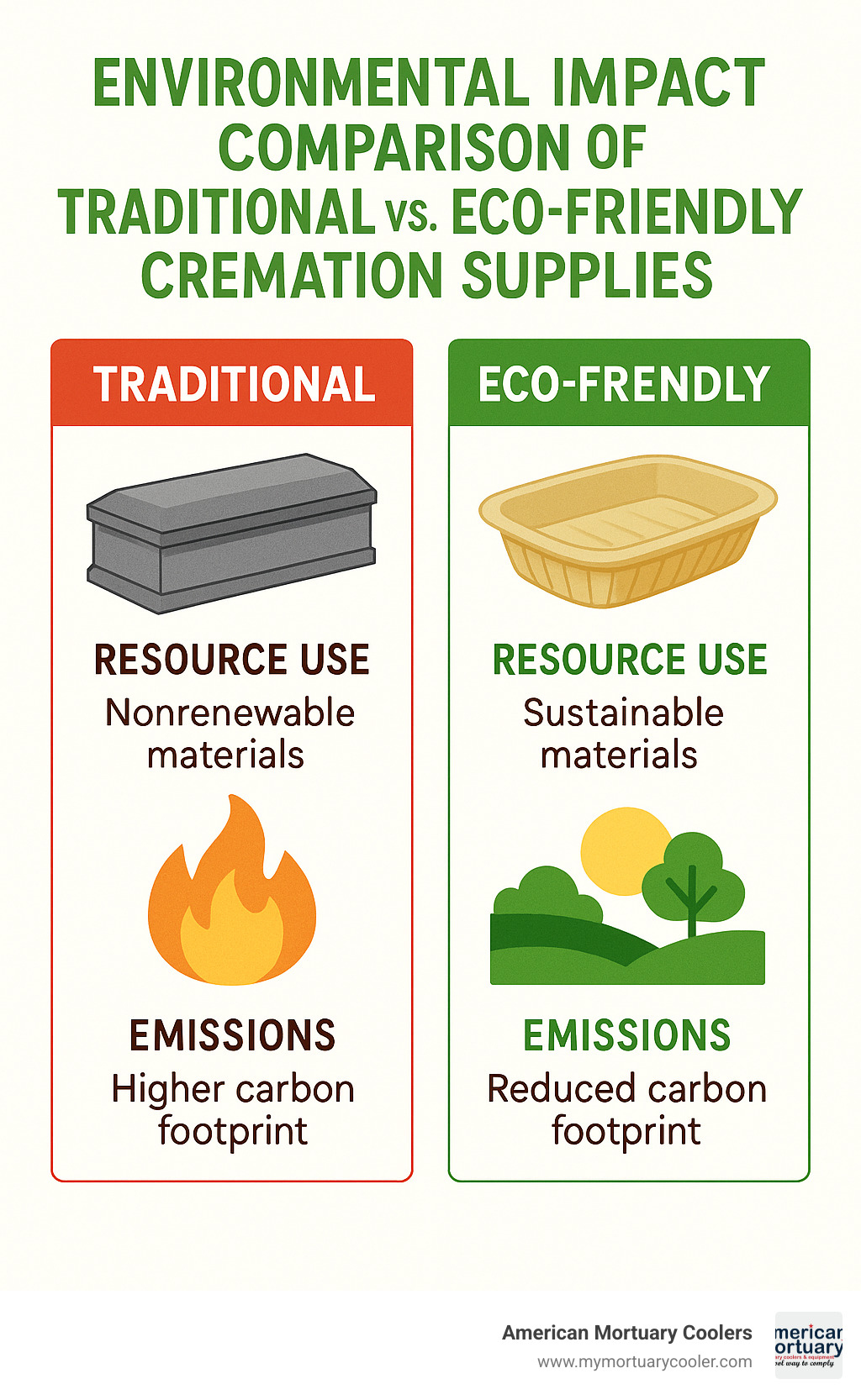
Environmentally Conscious Containers
The shift toward eco-friendly cremation supplies is more than just a trend—it's becoming a meaningful choice for many families. Green alternatives to standard cremation containers are gaining popularity, with options that leave a lighter footprint on our planet.
Biodegradable trays made from sustainable materials are leading this change, producing fewer emissions during the cremation process while maintaining the necessary structural integrity. Many funeral homes are now offering unbleached, recycled cardboard options that reduce chemical processing and waste without compromising on dignity or function.
"We've seen a 30% increase in requests for eco-friendly cremation options over the past three years," shares a funeral director who specializes in green services. "Families are increasingly concerned about their final environmental footprint."
For those seeking natural materials, bamboo or sustainable wood options provide renewable resources that burn efficiently. These materials offer the perfect balance of environmental responsibility and respectful presentation—especially important for witnessed cremations.
Eco-Friendly Urns and Containers
The journey toward sustainability continues after cremation with a growing selection of earth-friendly vessels for final disposition.
Water-soluble urns have become a thoughtful choice for families planning water scatterings. These urns gradually dissolve, leaving no trace behind—just memories. For families seeking a living memorial, plant-growth urns contain seeds or seedlings that use cremated remains to nourish new life, changing loss into renewal.
Biodegradable materials like handcrafted paper, salt compounds, and natural sand compositions return to the earth gently. These options provide comfort to environmentally conscious families while honoring their loved ones.
"When we show families our eco-friendly urn options, there's often this moment of relief," notes a compassionate funeral director. "They feel good knowing their final choice aligns with values their loved one held dear."
Emission Reduction Technology
Behind the scenes, the cremation industry is embracing technology that reduces environmental impact. Today's advanced cremation equipment includes low-NOx burners that significantly reduce nitrogen oxide emissions—a major environmental concern with traditional systems.
Advanced filtration systems now capture particulates before release, ensuring cleaner air around cremation facilities. Heat recovery systems improve efficiency and reduce fuel consumption, lowering both costs and carbon footprint.
These innovations represent substantial investments for crematory operators, but many find the long-term benefits worth the initial expense. As one crematory owner puts it: "Our new filtration system cost us upfront, but the peace of mind knowing we're being good neighbors—that's priceless."
Metal Recycling Programs
Compassionate recycling has become standard practice at forward-thinking crematories. After cremation, non-combustible metals from joint replacements, dental work, and other medical devices are carefully recovered and sent to specialized processors.
Many facilities donate the proceeds from these recycling programs to charitable causes, creating a meaningful legacy from materials that would otherwise be wasted.
"Our metal recycling program has generated over $10,000 for local hospice organizations," shares a crematory manager with pride. "It's a win-win—better for the environment and supportive of end-of-life care in our community."
Carbon Offset Partnerships
Some innovative cremation providers now offer carbon offset purchases to balance cremation emissions. These programs partner with reforestation projects or environmental conservation efforts to neutralize the carbon impact of each cremation.
"The cremation industry is evolving rapidly to meet environmental concerns," notes a CANA board member with 20 years in the field. "The suppliers developing eco-friendly cremation supplies are seeing significant growth as consumer awareness increases."
At American Mortuary Coolers, we've witnessed this evolution firsthand. The funeral professionals we serve increasingly request information about sustainable options and how they can reduce their environmental impact while maintaining the highest standards of care and respect.
As scientific research on green cremation continues to advance, we remain committed to offering cremation supplies that meet both traditional needs and emerging environmental concerns. After all, honoring loved ones and protecting the planet they've left behind can—and should—go hand in hand.
Vendor Selection, Pricing & Legal Considerations
Finding the right partner for your cremation supplies is about building a relationship, not just making a purchase. As someone who's worked with countless funeral professionals, I've seen how the right vendor partnership can make all the difference in your day-to-day operations.
Purchasing Restrictions
First things first - cremation supplies aren't available to just anyone, and for good reason. These specialized products are exclusively sold to licensed death care professionals:
"We do not sell cremation supplies to the general public," states New England Cremation Supply, echoing an industry-wide policy. "Only individuals from a crematory, funeral home, cemetery, or authorized educator may purchase."
This isn't about gatekeeping - it's about ensuring these specialized tools are used properly and respectfully. When you reach out to vendors, be prepared to verify your professional credentials. Most suppliers will ask for your license number or other documentation before processing your first order.
Regulatory Compliance
The cremation industry operates under careful oversight, and your supplies need to meet exacting standards. Quality vendors understand this landscape and only offer products that tick all the regulatory boxes:
UL-listed equipment certification provides assurance that electrical components meet safety standards. Your local fire marshal will thank you for using equipment that complies with regional fire codes, and your state funeral board likely has specific requirements about the tools and supplies you use.
OSHA is watching too - workplace safety isn't optional, and the right cremation supplies help you maintain a safe environment for your team.
Pricing Considerations
Let's talk dollars and cents. Pricing for cremation products isn't one-size-fits-all, and understanding the variables helps you budget effectively.
Bulk purchasing almost always saves money. If you're operating a busy crematory, buying cases rather than individual units typically reduces your per-unit cost significantly. Many suppliers offer tiered pricing that rewards higher volume purchases.
Quality matters too. As one crematory operator told me, "I learned the hard way that saving a few dollars on bargain heat-resistant gloves wasn't worth the discomfort and shorter lifespan." Premium products usually come with premium prices, but often deliver better value over time.
Don't forget to factor in shipping costs, especially for heavier items. As one major supplier notes, "Prices are subject to change without notice due to frequent supplier adjustments," so always get current quotes before planning major purchases.
Financing Options
For larger equipment investments, you don't necessarily need to pay everything upfront. Many vendors now offer flexible payment solutions:
"Now available: 3 payments of $995.00 each!" advertises one supplier for their processing equipment. These installment plans can make essential upgrades more manageable for smaller operations or those with tight cash flow.
Equipment leasing programs have also become increasingly common, allowing you to preserve capital while still accessing the latest technology. Some suppliers even partner with industry-specific lenders who understand the unique needs of funeral businesses.
Service Contracts and Support
The sale is just the beginning of your vendor relationship. What happens when something breaks down at 4 PM on a Friday?
Matthews Environmental Solutions highlights their "regional technician teams distributed throughout the United States," and that's exactly the kind of support you want to hear about before you need it. When evaluating vendors, ask pointed questions about:
Response time guarantees - How quickly can they get someone to your facility when problems arise? Warranty coverage - What's protected and for how long? Staff training - Will they show your team how to properly use and maintain the equipment?
As one family-owned supplier proudly shares, "We partner with a national manufacturer to provide equipment service and repair." This tells you they've thought beyond just selling you products.
Vendor Evaluation Criteria
When choosing who to trust with your cremation supplies needs, consider these key factors:
Industry experience matters - vendors who have served the cremation industry for decades understand the unique challenges you face. Their product range should align with your needs - some vendors specialize in certain categories while others offer comprehensive selections.
Pay attention to how responsive they are during your initial inquiries. If they're slow to answer questions before they have your business, imagine how they'll be when you have an urgent need.
Delivery capabilities are crucial too - even the best equipment doesn't help if it can't reach your facility reliably. And finally, ask for references from other crematory operators. Nothing beats hearing from colleagues who've already worked with a vendor.
At American Mortuary Coolers, we understand these considerations intimately. Our custom-crafted solutions are built with durability in mind, and we deliver directly to funeral professionals across the contiguous 48 states. We've built our reputation on being the kind of partner you can count on when it matters most.
Frequently Asked Questions about Purchasing Cremation Supplies
Who can legally buy cremation supplies?
If you've been searching for cremation supplies online, you might have noticed something interesting - you can't just add them to your cart and check out like regular products. There's a good reason for this.
These specialized products are only available to professionals in the death care industry. This means you'll need to be affiliated with a licensed crematory, funeral home, cemetery, or an authorized educational institution to make a purchase.
This isn't vendors being difficult - it's about ensuring these specialized tools are used properly and in compliance with industry regulations. As one supplier clearly states on their website: "We do not sell cremation supplies to the general public."
If you're a family member looking for information about cremation options, I'd recommend reaching out to your local funeral home or crematory. They can provide personalized guidance based on your specific situation and needs.
How should crematories store supplies safely?
Proper storage might not be the most exciting topic, but for crematory professionals, it's absolutely essential for safety, operational efficiency, and regulatory compliance.
Climate control is more important than you might think. Paper and cardboard products (like cremation containers) can warp or degrade in high humidity environments, potentially compromising their structural integrity when they're needed most.
Fire safety deserves special attention when storing cremation supplies. Maintaining appropriate separation between combustible materials and heat sources isn't just good practice - it could prevent a serious workplace incident.
Smart organization systems make daily operations smoother. Many successful crematories implement inventory tracking methods to ensure they never run out of essential supplies during busy periods.
A crematory operations consultant I spoke with recommends: "Maintain at least a two-week supply of essential items, but avoid excessive stockpiling of combustible materials. Too much inventory creates unnecessary fire hazards and takes up valuable space you could use for other purposes."
Are there financing options for large equipment purchases?
Absolutely! The sticker price on major cremation equipment can cause sticker shock, but there are several ways to make these investments more manageable.
Equipment leasing has become increasingly popular, offering fixed monthly payments with potential purchase options when the lease term ends. This approach helps preserve cash flow while still accessing needed equipment.
Many suppliers offer simple installment plans that divide payments over a set period without requiring formal financing approval. One supplier I found advertises: "Now available: 3 payments of $995.00 each!" for certain equipment packages.
For larger purchases like processing stations or hydraulic lift systems, you might explore options with industry-specific lenders who understand the funeral business and its unique financial considerations.
"Many of our clients use equipment financing to preserve their operating capital," explained a cremation equipment sales representative. "This strategy allows them to acquire state-of-the-art equipment while maintaining financial flexibility for other aspects of their business."
At American Mortuary Coolers, we understand that equipping your facility properly requires significant investment. That's why we're happy to discuss financing options that might work for your specific situation when you're ready to upgrade your cremation supplies and equipment.
Conclusion
When it comes to serving families with dignity and care, choosing the right cremation supplies isn't just about checking boxes—it's about creating a seamless, respectful experience during life's most difficult moments.
At American Mortuary Coolers, we've walked alongside funeral professionals like you for years, understanding that your challenges extend far beyond the cooler room. We know that every container, every tool, and every piece of safety equipment plays a crucial role in honoring someone's final journey.
The landscape of funeral service continues to evolve, with cremation rates climbing steadily across North America. In this changing environment, being equipped with the right supplies isn't just good business—it's essential for providing the compassionate care families expect.
As you consider your cremation supply needs, remember these guiding principles:
Safety is non-negotiable. Your team deserves the best protection available. Quality PPE might seem expensive until you compare it to the cost of an injury or workplace incident.
Quality pays dividends. We've seen it time and again—investing in durable, well-designed equipment actually saves money over time, reducing replacements and downtime.
Compliance brings peace of mind. Staying up-to-date with regulatory requirements isn't just about avoiding penalties—it's about sleeping well at night knowing you're doing things right.
Green options reflect changing values. More families are asking about environmental impact. Having eco-friendly alternatives ready shows you're listening and adapting.
Relationships matter. The best suppliers aren't just order-takers—they're partners who understand your specific challenges and stand ready to help when you need them most.
Here at American Mortuary Coolers, we take pride in crafting custom solutions that perfectly fit your facility's needs. From our workshop in Tennessee, we ship our durable, American-made equipment directly to funeral homes across all 48 contiguous states. We're not just selling products—we're supporting the important work you do every day.
The right cremation supplies do more than just get the job done—they allow you to focus on what matters most: supporting families through their grief journey with confidence and compassion.
Ready to lift your cremation services with reliable, high-quality supplies? We're here to help. Reach out to our team to discuss how American Mortuary Coolers can support your specific needs with custom solutions designed for excellence in funeral service.



















